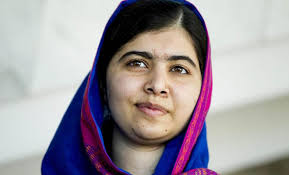ISLAMABAD, March 29, 2018 (BSS/AFP) – Nobel peace laureate Malala Yousafzai returned to Pakistan on Thursday, officials said, in her first visit to her native country since she was shot in the head by a Taliban gunman six years ago for advocating education for girls.
Malala is widely respected internationally for her bravery and activism, but opinion is divided in Pakistan where some conservatives view her as a Western agent on a mission to shame her country.
Malala is expected to meet with Prime Minister Shahid Khaqan Abbasi during the four-day trip but further details have been “kept secret in view of the sensitivity surrounding the visit,” a government official said.
Accompanied by her parents, the 20-year-old student was escorted through Islamabad’s Benazir Bhutto International Airport under tight security, according to photographs broadcast on local television.
Malala became a global symbol for human rights after a gunman boarded her school bus in the Swat valley on October 9, 2012, asked “Who is Malala?” and shot her.
She was treated for her injuries in the British city of Birmingham, where she also completed her schooling.
The youngest ever winner of the Nobel Peace Prize in 2014, she has continued to be a vocal advocate for girls’ education while pursuing her studies at Oxford University.
Many Pakistanis took to Twitter to express delight that the campaigner had returned for the visit, despite ongoing security fears.
“I welcome #MalalaYousafzai the brave and resilient daughter of Pakistan back to her country,” politician Syed Ali Raza Abidi wrote.
But she faces intense criticism from some Pakistanis, including hardline Islamists as well as members of the conservative middle class who support education for girls but object to airing the country’s problems abroad.
One leading Pakistani journalist, Hamid Mir, issued a plea for opposition politicians and commentators to exercise restraint when talking about the visit.
“International media is highly focused on her return and this (bad language) will damage Pakistan’s image,” he said.
– ‘Change the world’ –
Malala began her campaign aged just 11, when she started writing a blog — under a pseudonym — for the BBC’s Urdu service in 2009 about life under the Taliban in Swat, where they were banning girls’ education.
In 2007 the Islamist militants had taken over the area, which Malala affectionately called “My Swat”, and imposed a brutal, bloody rule.
Opponents were murdered, people were publicly flogged for supposed breaches of sharia law, women were banned from going to market, and girls were stopped from going to school.
But it was only after the shooting, and a subsequent near-miraculous recovery, that she became a truly global figure.
She opened a Twitter account on her last day of school in July 2017 and now has more than a million followers.
“I know that millions of girls around the world are out of school and may never get the opportunity to complete their education,” Malala wrote at the time.
During a recent appearance at the World Economic Forum in Davos, the feminist campaigner urged women to “change the world” without waiting for the help of men.
“We won’t ask men to change the world, we’re going to do it ourselves,” Malala said.
“We’re going to stand up for ourselves, we’re going to raise our voices and we’re going to change the world.”



